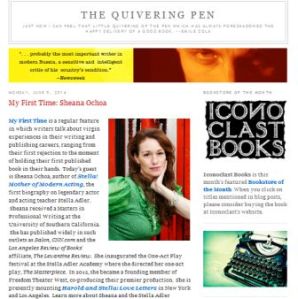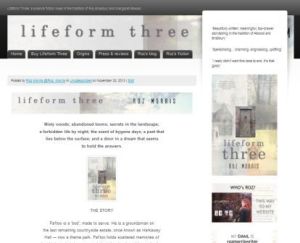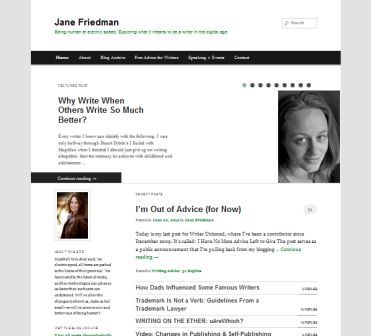 I’ve had a question from Tina L McWilliams: Besides Twitter, LinkedIn, Facebook etc, a website is obviously essential. But what type? Some writers have simple ones, with their books, an author biography and so forth. Others – you and Joanna Penn included – have ‘education’ sites. Which I love, and return to regularly. (Thanks! Ed) So, could you discuss the importance and the time involved with both?
I’ve had a question from Tina L McWilliams: Besides Twitter, LinkedIn, Facebook etc, a website is obviously essential. But what type? Some writers have simple ones, with their books, an author biography and so forth. Others – you and Joanna Penn included – have ‘education’ sites. Which I love, and return to regularly. (Thanks! Ed) So, could you discuss the importance and the time involved with both?
Oh my, do I have websites – here, here, here and of course right here. That’s four web homes. (I’ll explain why later, but first:)
Why have them at all?
If you’ve got Twitter, Facebook, G+, you’re certainly making good connections. But you’re fitting a limited format with little room to customise. You need a place to invite folks to when they want to know more.
Also, you control your website’s destiny. A social medium might disappear – or your crowd might (MySpace, anyone?). But your site is yours.
Quick detour – should your site be self-hosted? I’ve blogged about this here and here, including the importance of your own URL. (I’ll be talking about that later.)
How extensive does the site have to be?
If the site’s raison d’etre is to tell people who you are, you don’t need more than a few static pages – about you, your books, contact details. Perhaps a page of upcoming events if you do a lot of these (I don’t so I use social media for this). And voila: a website.
If you add a blog, you get noticed more. Search engines favour sites that are frequently updated. Human visitors like to see they’re on the blog of a person who regularly shows up, and notices when new folks call. There are a lot of dead, forgotten sites out there, so you need to make your site look alive.
 Should you blog about writing and publishing?
Should you blog about writing and publishing?
Honestly? The ether is choked with sites about writing and publishing.
Here’s a reason not to: being distinctive If you write straightforward posts about ‘show not tell’ you might find it hard to be noticed – and that’s one of our goals, right? So your posts need to be individual. A lot of writers blog about their lessons and mishaps on their writing journey, so you might find it hard to reach further than immediate friends.
Here’s a reason to: getting your material shared If the content is useful or strikes a chord, it’s more likely to be shared. Certainly a lot of people want to learn about writing and publishing. And you might win fans for your gloriously whacky voice (like Chuck Wendig).
But consider this:
Who do you want your content shared with?
Most authors who blog about writing will only reach other writers. That’s fine for me because writing tuition is part of what I do (but it’s not everything – see below). If you’re blogging to help people develop a taste for your fiction?  You might be better choosing something else:
You might be better choosing something else:
- your issues, if your fiction is issues based
- your historical period if appropriate
- other books in your niche
- host other authors (like Jane Davis), campaign for better recognition for indie authors (like Paul Sean Grieve), start a blog series like David Abrams on The Quivering Pen with My First Time or me with The Undercover Soundtrack.
Blogging to promote your fiction? The dilemma for literary authors
I still haven’t sussed this myself. Partly this is because my kind of fiction doesn’t suggest bloggable ‘topics’. One book might deal with, say, musicians, reincarnation and despair (My Memories of a Future Life). Another might feature repressive regimes and ruined country houses (Lifeform Three).
Even so, those aren’t really my ‘subjects’. I can write the odd guest post about them, but not regular blogs. Ever Rest and my embryonic ideas are different again. My signature, if I have one, is thematic: ideas of the soul and memory, conditions of haunting. I have only realised this as I roam about in Novel 3. I could blog about those themes, but it might discharge my need to explore them in the books.
So subject and issues blogging isn’t going to work for me. But it might be good for you.
Make it regular
Your blog needs to look current. So make blogging a regular appointment. Include a calendar so visitors can see the pattern. A list of previous or popular posts will tempt them to stay longer. The longer people stay on your site, the better.
How frequently should you blog?
As often as you find manageable. Experts say that for SEO significance it should be several times a week, but that might exhaust most of us. And think of it from the reader’s perspective. How much time do you have to read blogs, even the ones you love? Once a week is probably plenty to keep you on the radar.
Which brings me to… what I do and how much time I spend.
Why do I have so many sites?
It was an accident, but it seems to work. Each site has a distinct purpose, and they’re all connected to one hub and to each other.
Nail Your Novel
This one you’re reading is my original site. More here about how it started, where you can also see charming screenshots of how my blogs looked in 2011 (eek!).
Post frequency: I put up a writing/publishing post once a week plus a trailer for The Undercover Soundtrack. Plus signposts if I’ve got a guest spot or devilishly exciting news like a launch. Overall, at least 2 posts a week.
Time taken: I can’t just slap a post out. I spend at least 5 hours of cogitating, checking examples to make sure I’m not making idiotic assumptions, finding pics. You don’t have to spend as long if that’s not your style. Later there are comments to answer, shares to acknowledge and other networking to do. Every few months I might tweak the sidebar icons, so that’s another occasional hour or two. I reckon my blog swallows a full day a week – at least. (Is that shocking?)
 My Memories of a Future Life and The Undercover Soundtrack
My Memories of a Future Life and The Undercover Soundtrack
Post frequency: twice a week. One trailer to introduce my guest, written by me. One Soundtrack post. Although I don’t write these, they take time behind the scenes. I book guests well in advance (as you’ll know if you’ve featured!). When posts come in, I read them, write back with praise (of course!) and quite often ask for tweaks if I think this would make them fit the format better.
Time taken: about 2 hours per week, depending on resubmissions.
How it started: I’d built a blog for writers, but it wasn’t designed for introducing my fiction. When I launched my novel, I worked out a separate profile-building strategy and wrote this post full of bold plans. I reread it just now and added updates for what lasted and what proved daft or impossible to sustain. Mostly the latter. You might find it amusing.
Another reason to have a separate site was to claim the URL. There are several reasons:
- Easier for readers to find in a Google search
- A handy and sensible URL to put on business cards
- Allowed me to create a separate site with artwork in the novel’s livery (if I went self-hosted again I could have done this without making a separate site, but that would have been too disruptive)
- I can transfer it if I want
Roz Morris, author
I got this by accident. I broke the original Nail Your Novel site, so tried WordPress hosting. I found I’d been given a blog called RozMorris, which sat idle before I realised it even existed. Then I decided to use it as a hub for the others.
Time taken: a few hours to set up introductory pages. I’ve added other material gradually as I write it for other purposes – perhaps 20-30 minutes at a time.
Updating when a new book launches I set aside a few hours to add a new page, update pics and the main header, then all the versions of it on my newsletter head, FB page, blog head and sidebar, G+, Twitter biography… I’ve got a master list in my production schedule so I don’t miss anything.
Lifeform Three
This is a separate site with its own URL, knitted into the others.
site with its own URL, knitted into the others.
Time taken: like the main a uthor site above.
uthor site above.
So many sites!
I did warn you. If I was starting now, I’d have one blog and one author site for everything else. But The Undercover Soundtrack became its own entity, and I couldn’t graft Lifeform Three on without breaking it. I also couldn’t leave Lifeform Three as a poor cousin with no presence of its own.
 So my web-web is like a house that’s been extended and extended as times change and the family grows. I don’t doubt it looks messy to purists, and especially when explained here. I’m anticipating comments of horror. However, I don’t think readers mind if the navigation is clear. I doubt they notice the different URLs. But they would certainly baulk if they had to learn a different visual grammar each time. Even though the artwork on each site is different, it follows the same core design so they find what they want quickly.
So my web-web is like a house that’s been extended and extended as times change and the family grows. I don’t doubt it looks messy to purists, and especially when explained here. I’m anticipating comments of horror. However, I don’t think readers mind if the navigation is clear. I doubt they notice the different URLs. But they would certainly baulk if they had to learn a different visual grammar each time. Even though the artwork on each site is different, it follows the same core design so they find what they want quickly.
And yes, apologies. This post is a tad late. Because sometimes life gets in the way of blogging.
Thanks for the blogging pic, Mike Licht of Notions Capital.com
 NEWS I’m thrilled to announce I’m teaching a Guardian Masterclass in advanced self-editing techniques for fiction writers. Of course, London might not be a manageable distance for you, but if it is, here’s where to find out more. And … psst … it’s one of the many good things that have happened because once upon a time, I started a blog.
NEWS I’m thrilled to announce I’m teaching a Guardian Masterclass in advanced self-editing techniques for fiction writers. Of course, London might not be a manageable distance for you, but if it is, here’s where to find out more. And … psst … it’s one of the many good things that have happened because once upon a time, I started a blog.
Do you have a blog, a website or both? How much time do you spend on them? Do you want to suggest a way for me to streamline mine? Tell me in the comments!
 This time a decade ago, I was starting a blog.
This time a decade ago, I was starting a blog.

























